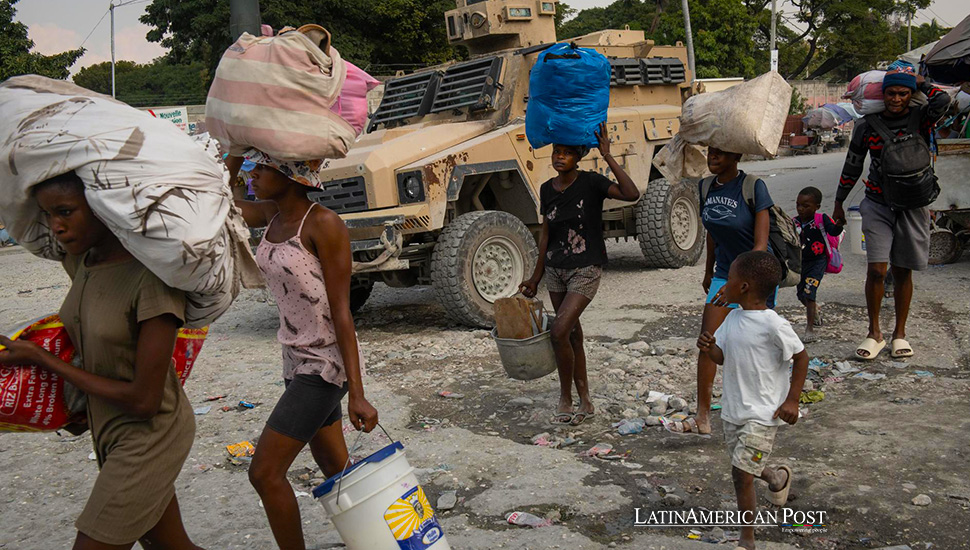Haiti’s Escalating Violence Evidenced in a Crisis of killings, Kidnappings, and Displacement

In Haiti, violence surged in the last quarter of the year, claiming over 2,300 victims through killings, injuries, or kidnappings—a nearly 10% increase from the previous quarter. The power vacuum left by gang leader Andrice Isca’s death triggered brutal territorial disputes in Port-au-Prince, exacerbating a humanitarian crisis that has displaced thousands and left the nation in turmoil.
Unraveling Chaos: Haiti’s Descent into Violence
In the labyrinthine alleys of Cite Soleil, Haiti’s most notorious slum, gunfire echoes no longer startle. Here, violence is not an anomaly; it’s the air that breathes life into a cycle of despair and fear gripping the heart of Port-au-Prince. The final quarter of last year marked a chilling crescendo in this symphony of brutality, as reported by the United Nations Integrated Office in Haiti (BINUH). The statistics are harrowing: over 2,300 individuals were killed, injured, or kidnapped—a nearly 10% increase from the preceding quarter, underscoring a crisis that continues to metastasize with devastating human costs.
At the epicenter of this upheaval was the death of Andrice Isca, an influential gang leader whose absence tore open a Pandora’s box of territorial skirmishes. The vacuum he left set the stage for a two-week bloodbath that claimed nearly 270 lives in Cite Soleil alone, as factions within the formidable G-9 Family and Allies clashed with their rivals in the G-Pep coalition. This violence is not merely about control; it’s a macabre dance for dominance, played out on the streets of a city already suffocating under the weight of historical injustices and contemporary neglect.
Humanitarian Catastrophe: Fallout from Gang Clashes
The humanitarian fallout from these clashes is catastrophic. Over a thousand souls, uprooted by fear, sought refuge wherever sanctuary could be found, their homes abandoned to the whims of warlords. The report starkly highlights the grim reality of gang fatalities—262 gang members perished in the last quarter, a number deemed inconsequential by the gangs themselves. The ease with which these groups replenish their ranks, drawing from the despondent pools of poverty that mark much of Haiti’s urban and rural landscapes, is a sobering testament to the depth of despair that fuels their endless ranks.
Kidnappings, a terror that spares no social echelon, surged by nearly 20%, trapping almost 700 individuals in the last quarter alone. No one is immune from the humblest street vendor to the most esteemed professional. This epidemic of abductions reflects a breakdown of societal norms and the rule of law, casting a long shadow over daily life in Haiti. Gangs, encouraged by their dominion over vast territories, have also weaponized sexual violence as a tool of war, cruelty amplified by the digital age’s voyeuristic lens, further degrading their victims in a public spectacle of humiliation.
Children in Crosshairs
Children, the most vulnerable of all, find themselves in the crosshairs of this relentless violence. More than 50 young lives were extinguished in the last quarter, including a 10-year-old boy executed by the Grand Ravine gang under the baseless accusation of being a police informant. These are not isolated tragedies; they are the manifestations of a systemic assault on the innocence and future of Haiti’s youth.
The scale of displacement wrought by gang violence is staggering. Over 310,000 individuals, including some 170,000 children, now find themselves without a place to call home, their lives upended by the chaos that reigns unchecked. The cumulative toll of violence in Haiti last year—more than 8,400 killed, injured, or kidnapped—paints a grim portrait of a nation in the throes of an existential crisis, with numbers more than doubling those reported in 2022.
In response to this dire situation, BINUH has called for the expedited deployment of a foreign armed force. This plea echoes the desperation for a semblance of stability and security. However, international intervention remains a distant hope. Just last week, a court in Kenya halted the U.N.-backed deployment of police officers to Haiti, citing constitutional concerns—a decision that underscores the complexities of international response to Haiti’s plight.
The fabric of Haitian society, woven through centuries of struggle, resilience, and resistance, is torn by the forces claiming to fight for its liberation. The gangs, once perhaps defenders of their communities against external threats, have morphed into tyrants, their legitimacy eroded by the blood of the innocent. The government’s inability to stem this tide of violence, coupled with international inertia, leaves a void filled only by despair and the relentless cycle of retribution and loss.
Yet, amid the darkness, the spirit of the Haitian people endures. In the face of overwhelming adversity, communities rally to protect their own, to rebuild from the ashes of conflict, and to hold onto hope for a future free from the shackles of violence. Haiti’s citizens’ resilience and unwavering determination to reclaim their nation from the precipice of collapse is a testament to the indomitable human spirit.
International Duty: Beyond Crisis Intervention
The crisis in Haiti is not merely a domestic issue; it is a stark reminder of the international community’s responsibility not only to intervene in moments of acute crisis but also to invest in the long-term development and stability of nations on the edge. The story of Haiti’s struggle against violence is a clarion call for a renewed commitment to supporting democratic institutions, empowering local communities, and fostering a culture of peace and reconciliation.
As Haiti grapples with this relentless wave of violence, the path forward is fraught with challenges. Yet, it is also ripe with opportunities for meaningful change. The international community, in partnership with Haitian authorities and civil society, must forge a comprehensive strategy that addresses the root causes of violence, strengthens the rule of law, and invests in the social and economic development of Haiti’s people.
Also read: Peruvian Press Unions Defend Satire, Condemn Police Legal Action Against Cartoonist
In the heart of darkness that envelops Haiti lies a glimmer of light—a chance for redemption, peace, and a new chapter in the nation’s storied history. The road to recovery is long and uncertain. Still, Haiti’s people’s resolve and resilience in the face of impossible odds offer hope for a nation yearning for tranquility and prosperity. The time for action is now, lest the shadows of chaos consume the future of this proud and resilient nation.




